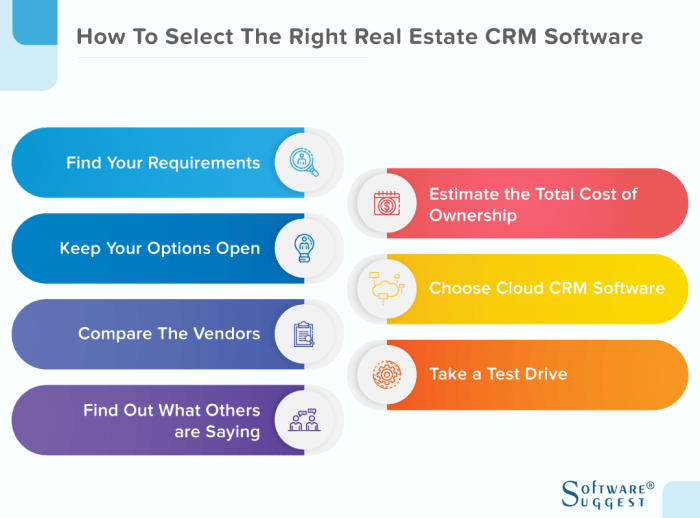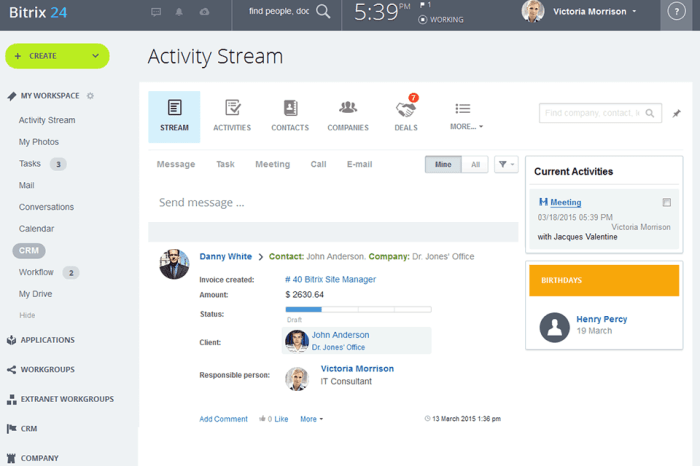Best CRM software for commercial real estate is crucial for success in today’s competitive market. Efficiently managing leads, tracking deals, and nurturing client relationships are paramount. The right CRM system can streamline operations, improve communication, and ultimately boost profitability. This exploration delves into the key features and benefits of selecting the optimal CRM solution for commercial real estate professionals.
Factors to consider include the size of your brokerage, the specific needs of your team, and your budget. Integration with other essential tools, such as marketing automation platforms and property management systems, is also vital. Different CRMs offer varying levels of customization and scalability, ensuring a tailored solution for individual businesses. Understanding these nuances will guide you towards making an informed decision.
The commercial real estate (CRE) industry is dynamic and competitive. Managing leads, tracking deals, and nurturing client relationships effectively is crucial for success. A robust Customer Relationship Management (CRM) system is no longer a luxury but a necessity for CRE professionals. This comprehensive guide explores the best CRM software options tailored to the unique needs of commercial real estate brokers, agents, investors, and property managers.
Selecting the best CRM software for commercial real estate involves careful consideration of your specific needs. However, the principles often overlap with other sectors; for example, the challenges faced are similar to those in construction, where finding the right best crm software for construction is equally crucial for project management and client communication. Ultimately, the ideal CRM for commercial real estate will streamline your processes and improve client relationships.
We’ll delve into key features, pricing models, and considerations to help you choose the perfect CRM to streamline your operations and boost your bottom line.
Key Features of a Top-Tier CRE CRM: Best Crm Software For Commercial Real Estate
A successful CRM for commercial real estate must go beyond basic contact management. It needs to address the specific complexities of the industry. Here are some essential features to look for:
Contact Management & Lead Tracking:
- Comprehensive contact profiles: Store detailed information about clients, including their investment goals, property preferences, and communication history.
- Lead scoring and qualification: Prioritize high-potential leads based on predefined criteria.
- Lead source tracking: Identify the most effective channels for generating leads (e.g., networking events, online advertising, referrals).
- Automated lead assignment: Distribute leads efficiently among your team members.
Deal Management & Pipeline Tracking:
- Visual pipeline management: Track the progress of deals through different stages (e.g., prospecting, negotiation, closing).
- Customizable deal stages: Adapt the pipeline to reflect your specific sales process.
- Automated reminders and notifications: Ensure timely follow-up on deals and tasks.
- Collaboration tools: Facilitate seamless communication and information sharing among team members.
Property Management Integration:
- Property listings and details: Centralize information about properties, including photos, floor plans, and key features.
- Market analysis tools: Access up-to-date market data and insights to inform your strategies.
- Tenant management features (if applicable): Manage tenant information, leases, and rent payments.
Reporting & Analytics:
- Customizable reports: Generate reports on key performance indicators (KPIs) such as lead conversion rates, deal closure times, and revenue generated.
- Data visualization: Present data in clear and concise charts and graphs for easy understanding.
- Real-time dashboards: Monitor key metrics and identify areas for improvement.
Other Important Considerations:, Best crm software for commercial real estate
- Integration with other tools: Seamless integration with email marketing platforms, marketing automation tools, and other essential software.
- Mobile accessibility: Access your CRM from anywhere, anytime.
- Security and data privacy: Ensure your sensitive data is protected.
- Scalability: Choose a CRM that can grow with your business.
- Customer support: Reliable customer support is crucial for resolving issues and getting the most out of your CRM.
Top CRM Software Options for Commercial Real Estate
The market offers a variety of CRM solutions, each with its strengths and weaknesses. Here are some of the leading contenders:

Source: amazonaws.com
1. Salesforce
Salesforce is a powerful and versatile CRM platform known for its extensive features and scalability. While it’s a robust option, it can be complex and expensive for smaller firms. Its customization options are extensive, allowing for tailoring to specific CRE needs. However, it often requires specialized training and implementation support.
2. HubSpot CRM
HubSpot offers a user-friendly and comprehensive CRM with a free plan for smaller businesses. Its marketing automation capabilities are a significant advantage, allowing for targeted lead nurturing and campaign management. The platform is known for its intuitive interface and strong reporting features. While the free plan is limited, its paid tiers offer more advanced functionality.
3. Zoho CRM
Zoho CRM is a cost-effective option with a wide range of features suitable for CRE businesses of all sizes. It offers excellent customization options and integrates well with other Zoho applications. Its affordability and user-friendly interface make it an attractive choice for budget-conscious firms. However, its extensive features can feel overwhelming to some users.
4. Copper CRM

Source: fixthephoto.com
Copper is a Google Workspace-native CRM designed for seamless integration with Gmail and Google Calendar. This makes it an excellent choice for CRE professionals who heavily rely on Google Workspace. Its intuitive design and straightforward functionality make it a user-friendly option, though it might lack some of the advanced features found in more comprehensive platforms.
5. Pipedrive
Pipedrive is a sales-focused CRM known for its simple and intuitive interface. Its visual pipeline management is particularly useful for tracking deal progress. While it excels at sales pipeline management, it may lack the depth of features needed for comprehensive property management or advanced analytics in larger CRE operations.
Choosing the Right CRM for Your CRE Business
Selecting the right CRM involves careful consideration of your specific needs and budget. Here’s a step-by-step guide:
- Assess your needs: Identify your key requirements, including contact management, deal tracking, reporting, and integration needs.
- Set your budget: Determine how much you’re willing to invest in a CRM solution.
- Research different options: Explore various CRM platforms and compare their features, pricing, and user reviews.
- Request demos: Schedule demos with shortlisted vendors to see the software in action.
- Consider implementation and training: Factor in the time and resources required for implementation and user training.
- Choose the best fit: Select the CRM that best meets your needs, budget, and technical capabilities.
Frequently Asked Questions (FAQ)
- Q: What is the best CRM for small commercial real estate firms? A: HubSpot CRM and Zoho CRM are popular choices for smaller firms due to their affordability and user-friendly interfaces.
- Q: How much does commercial real estate CRM software cost? A: Prices vary significantly depending on the vendor, features, and number of users. Some offer free plans, while others charge monthly or annual subscriptions that can range from a few hundred to thousands of dollars.
- Q: Can a CRM help me improve my lead generation? A: Yes, many CRMs offer lead scoring, automation, and reporting features that can significantly improve your lead generation and conversion rates.
- Q: Does my CRM need to integrate with my other software? A: Integration with email marketing platforms, accounting software, and other tools can significantly streamline your workflow and improve efficiency. Consider which integrations are most crucial for your business.
- Q: How do I choose the right CRM for my team size? A: Consider the number of users and the features required for your team’s size. Scalability is crucial for growth, so choose a CRM that can adapt to your expanding needs.
Conclusion
Investing in the right CRM is a strategic move for any commercial real estate business. By streamlining operations, improving lead management, and enhancing client relationships, a well-chosen CRM can significantly contribute to your success. Carefully consider your specific needs, budget, and the features Artikeld in this guide to select the perfect CRM to propel your CRE business to new heights.
References
Call to Action
Ready to transform your commercial real estate business? Start your free trial or request a demo of your preferred CRM today and experience the power of streamlined operations and enhanced client relationships!
Choosing the best CRM software for your commercial real estate business is a strategic investment. By carefully evaluating your needs and exploring the various options available, you can significantly enhance your efficiency, improve client relationships, and ultimately drive revenue growth. Remember to prioritize user-friendliness, robust features, and seamless integration with your existing workflow. The right CRM will become an invaluable asset, empowering you to succeed in the dynamic world of commercial real estate.
FAQ Insights
What are the key features to look for in a commercial real estate CRM?
Essential features include contact management, deal tracking, lead management, reporting and analytics, task management, and communication tools (email, phone, etc.). Integration capabilities with other platforms are also crucial.
How much does commercial real estate CRM software typically cost?
Pricing varies significantly depending on the features, scalability, and vendor. Expect a range from affordable monthly subscriptions to more substantial enterprise-level solutions.
Can a CRM help improve my team’s collaboration?
Yes, a well-implemented CRM fosters collaboration by providing a central hub for information, enabling team members to access and update client data, track progress on deals, and communicate effectively.
How do I choose between cloud-based and on-premise CRM solutions?
Cloud-based CRMs offer accessibility, scalability, and cost-effectiveness. On-premise solutions provide greater control over data and security but require more IT infrastructure.
